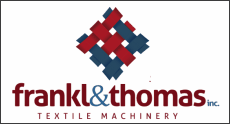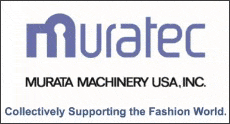
Posted November 28, 2017
By Devin Steele (DSteele@eTextileCommunications.com)
MONROE, N.C. – If you’re looking for a genuine, made-in-America textile machinery story, you’ll find the real McCoy in this small town nestled 25 miles east of Charlotte.
But just call it McCoy. That’s the new trade name of a company many of you may have known as McCoy-Ellison or McCoy Machinery over the past half century-plus. The new name is just part of a larger rebranding effort that covers everything from the company’s color scheme to its website to its physical infrastructure to its trade show exhibition space to even its employee ethos.
Kevin Ahlstrom, the company’s longtime sales director who bought the company last year from retiring Dan McCoy Jr., initiated the changes to demonstrate his long-term commitment to the company/U.S. manufacturing and to do his part to help remake the image of traditional manufacturing, he said.
McCoy, a provider of warp preparation equipment to the traditional textile industry and other sectors such as composites, has always been pro-made in America, as you would guess, but Ahlstrom as owner has doubled down on that mantra, he said. Visually, he has reinforced that commitment by having an American flag with the tagline “Proudly Made In The USA” designed as part of its new creative collateral.
“We make a conscious effort to try to be a 100 percent made-in-America company, and we’re working hard every day to make that happen,” Ahlstrom said. “We make 98 percent of our parts and components here, and what keeps us from succeeding immediately are suppliers. We have to buy some of our small parts from foreign sources because they aren’t made in the U.S.”
To reach its goal of 100 percent American made, the company is working to develop those parts in-house. “We're going to bring it all back,” he said. “If I have to eat a dollar, I think it's important for customers to know that we're making everything here.”
McCoy is one of the remaining U.S. textile machinery manufacturers left, and the only one in the warp prep arena – a fact the company touts, but “we don't mean that arrogantly,” Ahlstrom said. “We're proud of the fact that we’ve made it this far. For 53 years, there has been a McCoy Machinery, and a piece of machinery has been built here for that long. And we don't have a foreign partner. Others have maintained a namesake domestically, but they have foreign partners.”
Oh, and business is booming, for a variety of reasons, not the least of which is machinery sales. The company provides technical service and support to customers old and new, and offers the largest warping parts inventory (worth $1 million-plus), Ahlstrom said. McCoy also offers creels for many applications, not just traditional textiles: industrial duct tape, wind/energy, carbon fiber, fiberglass reinforcement and geo scrims, for instance.
Growth has driven the need for expanded staff, and the company has hired several people, including engineers, in the last couple of years to support new and existing customers, he said.
“The business is here to justify it,” he said.
Big vision requires changes
When Ahlstrom bought the company in October 2016, he had a big vision for the company but wasn’t sure how receptive to change his employees would be, he said.
“Anyone who takes over an existing company that has 53 years of service in the industry will have a few challenges,” he said. “And when you want to change, that requires a change in attitude. Everybody screams for change until you make change. You get questioned, but I think for the most part, everyone is on board.
“There is a lot of legacy here, and we're proud of it,” he continued. “There is some inherent internal legacy that we have had to overcome, but some of those things needed to be freshened up to be made current.”
Not the least of which was its color scheme and logo. For many years, McCoy equipment has been easily recognizable by its “split pea” green paint and a similar logo hue. But Ahlstrom hired a designer and gave her 100 percent creative rein to come up with a new logo and colors, he said. The new colors are called signal blue and agate gray, which Ahlstrom called more modern.
“The logo that we chose stuck out with everybody,” he said. “I asked my management team, ‘what do you think?’ and we all pointed to the same logo. And I thought the color change would be a big issue for everybody, but I didn’t hear one negative comment about it.”
On the production floor currently is the first McCoy machine with the new color scheme, the RB-12 Rebeamer, along with a second machine for a fiberglass producer.
Robbie Funderburk, a 37-year employee who serves as the company’s manufacturing supervisor, said the new color, in particular, reflects the changing company.
“Once we get the new colors fully in place, it will just about feel like a new company,” he said. “We’re looking forward to that because, after seeing green for almost 40 years, the new colors kind of change your mind about things, especially since we’re bringing in new customers and new projects.”
And the name change? “We're pitching McCoy now instead of McCoy Machinery, and that’s not a knock. It's just that when people talk about us, they say ‘McCoy’ and don't use the full legal name.”
The website redesign also reflects a modern flair, where what was once machinery, the centerpieces are now end-use applications for textile products created via McCoy fiber delivery systems, such as an airplane, firefighters, a soldier and high fashion. But the website does pay homage to its history, particularly the McCoys (founder Dan Sr. and his sons Dan Jr. and Bruce).
Dan McCoy Jr., in fact, loves the changes that have been made, Ahlstrom said. “That makes you feel pretty good when the former owner comes back and tells you he really likes what has been done,” he said.
Other changes
The company’s new trade show booth, which will debut at CAMX in December and again at Techtextil North America in Atlanta in May, is “unlike anything anybody has ever seen McCoy do,” Ahlstrom said. “It's three dimensional, and we won’t have any machinery there. It’s going to be a hospitality booth for people to just drop in and say hello. We want to have a place to let people know we're still around, we're doing well and we’ll continue to care for the machines that you own through service and support.”
At the company’s headquarters, changes are evident and were needed – particularly as the company competes for orders at Fortune 500 companies, Ahlstrom said. The building was gutted and modernized, with carpeting reflective of the company’s new color scheme. J&J Flooring, a McCoy customer, outfitted the office with knitted modular carpet squares, a new product that the Dalton, Ga.-based company is selling to airports and other large spaces.
“We brought a Fortune 5 aerospace company into our office two-and-a-half years ago, and I said ‘this is who we are,’ Ahlstrom said. “But sometimes David wins against Goliath and we were awarded a few small orders, and that kind of propelled us to improve our image and modernize our building.”
McCoy also renovated its machine shop, adding all new machinery, the idea being to “regain control over quality and efficiencies,” Ahlstrom said, which Funderburk called “a tremendous help to us.” New toolboxes were also provided for all of the maintenance staff.
“We're still in that changeover phase, but everything is looking better, and attitudes are better,” Funderburk said. “We're getting on track and I think by the end of the year, we'll have everything together and we’ll all be going in the right direction.”
Internally, the company is making a concerted effort to create a stronger team environment, according to Ahlstrom, among them providing T-shirts to all 34 team members that read, “Team McCoy.”
“We're doing little things to improve morale, camaraderie and the team atmosphere here,” he said.
Part of that push includes quarterly “State of the Union” addresses, delivered during luncheons that include a “prize wheel,” during which time Ahlstrom explains how the business is doing and where it was compared to the previous year, discusses areas where improvement is needed and gets feedback.
“The staff has been very receptive to the changes,” Ahlstrom said. “There has been some skepticism, I think, which is expected. We have some long-timers here, but most everybody understands that we're going to take the ball across the line, and we want to bring everybody with us. Sometimes, it's kicking and screaming, but at the end of the day, we're doing it for everybody.”
‘Wind left in this sail’
When Ahlstrom was considering buying the company from his longtime friend and colleague, Dan McCoy Jr., he said he would do so only on one condition: That Robin Belk, now the company’s vice president of operations, stay on board, he said. Belk knows all sides of the business, having worked in every department since joining the company 40 years ago, he said.
“There is no possible way that I would or could do it without Robin,” he said. “She started here as a secretary and became one of the best sales persons we've ever had.”
Though flattering that he wanted her to stay, the decision was not difficult, she said.
“I've seen the good, the bad and the ugly of the textile industry,” Belk said, “but when you get it in your blood, you cannot get it out. And I could see the vision Kevin had and I knew it was very positive for our future. I felt that if he could use me then I needed to be here because this is where I wanted to be.”
She added that Ahlstrom was just what the company needed as it began to expand into composites and other markets, and as the made-in-America movement was beginning to hit its stride.
“What he brought to the company was a new energy,” she said. “From the employees' standpoint, they're beginning to realize that, hey, there is still some wind left in this sail and we need to see if we can't get back to full steam. From the customers' standpoint, I think his approach to custom solutions is much needed. There are plenty of opportunities that we're willing to explore with our customers.”
The company also has youthful energy among its ranks with new hires in recent years. Among them is Ahlstrom’s son Davis, who replaced his father as sales director, along with two new engineers.
Seeing his vision for the company come to life is pleasing to Ahlstrom, but he said the credit goes to the entire team.
“My biggest fear in life is failure,” he said. “I hate to lose. I know you can't win them all but you can do your best. And you can't win without a good team. That's what I keep telling everybody. One of you can drag us right to the bottom by making us miss deliveries or making us do things incorrectly. It's not just one person or one group – it's not just manufacturing, it's not just customer service, it's not just sales. You have to have that team mentality, and everybody working and pulling in the same direction.”
That appears to be the case, with much change occurring in just a year under Ahlstrom’s leadership. And more changes lie ahead, including a software installation that will connect parts, purchasing, accounting, sales and manufacturing, he said.
“We're proud of the changes we've made and we're proud of our heritage and we're going to keep it going,” he said.
Seeking made-in-USA textile machinery story? Here’s the rebranded real McCoy
 |
|---|
 |
 |
 |
 |
 |
 |
 |
 |
 |









